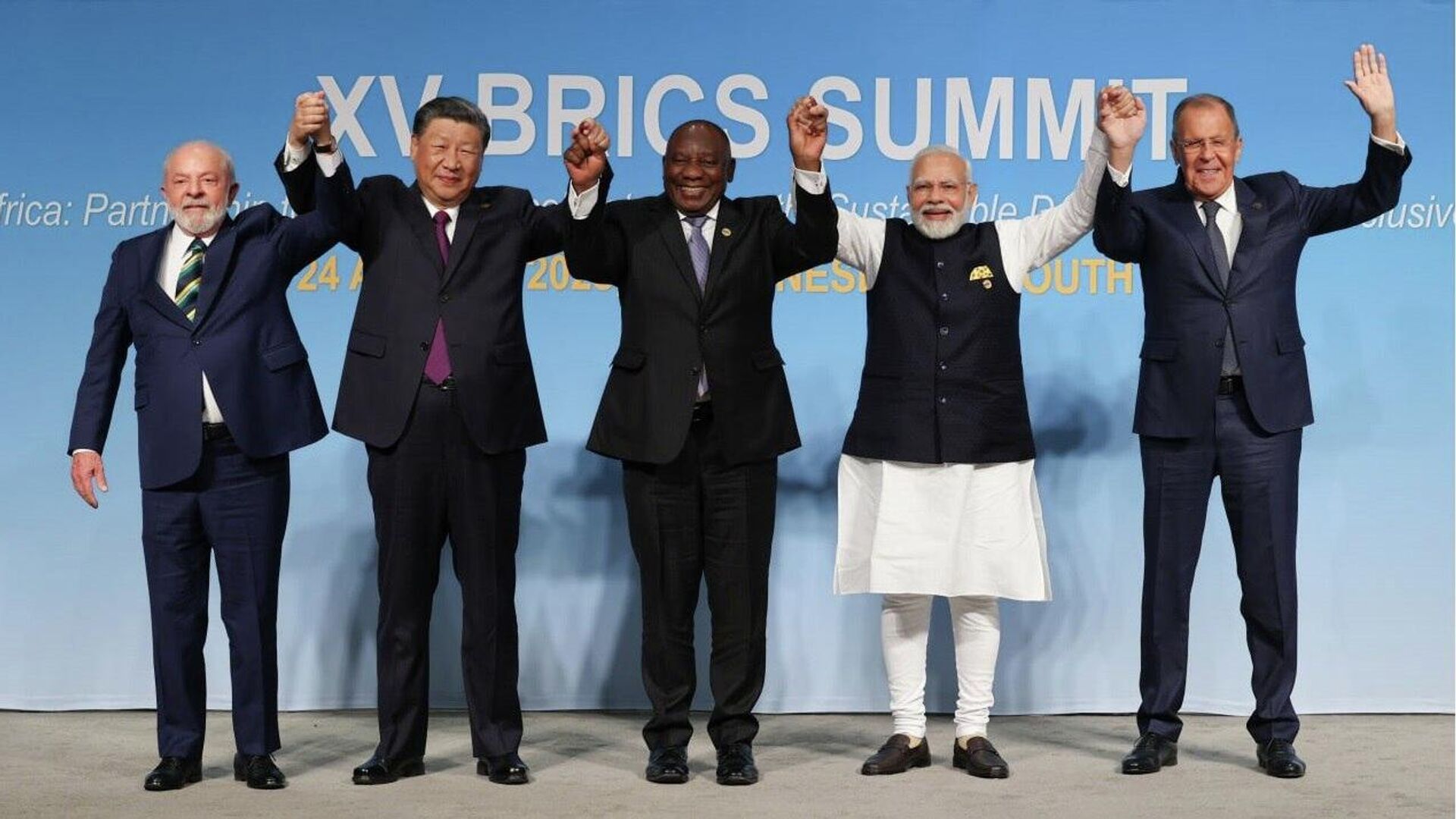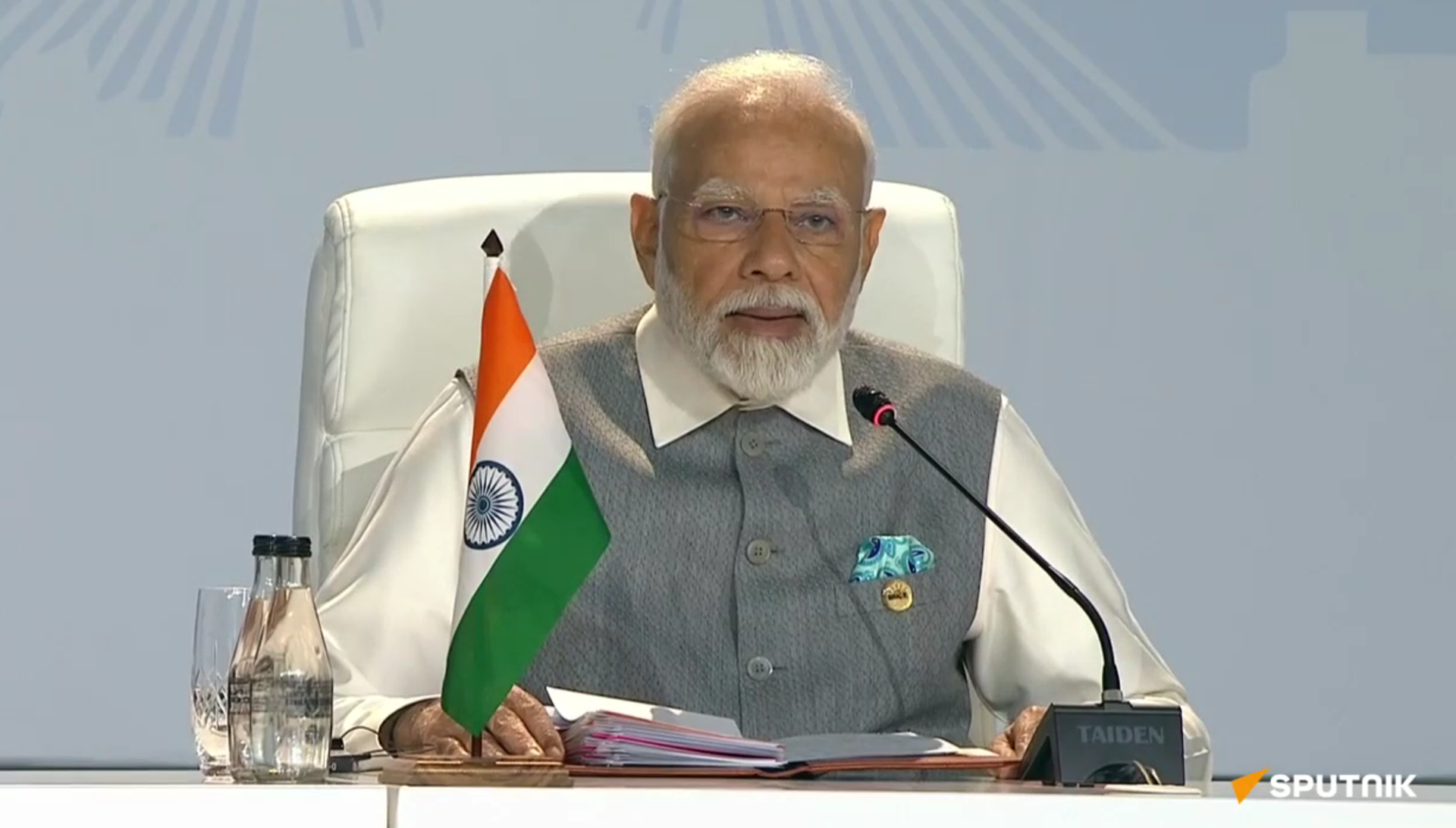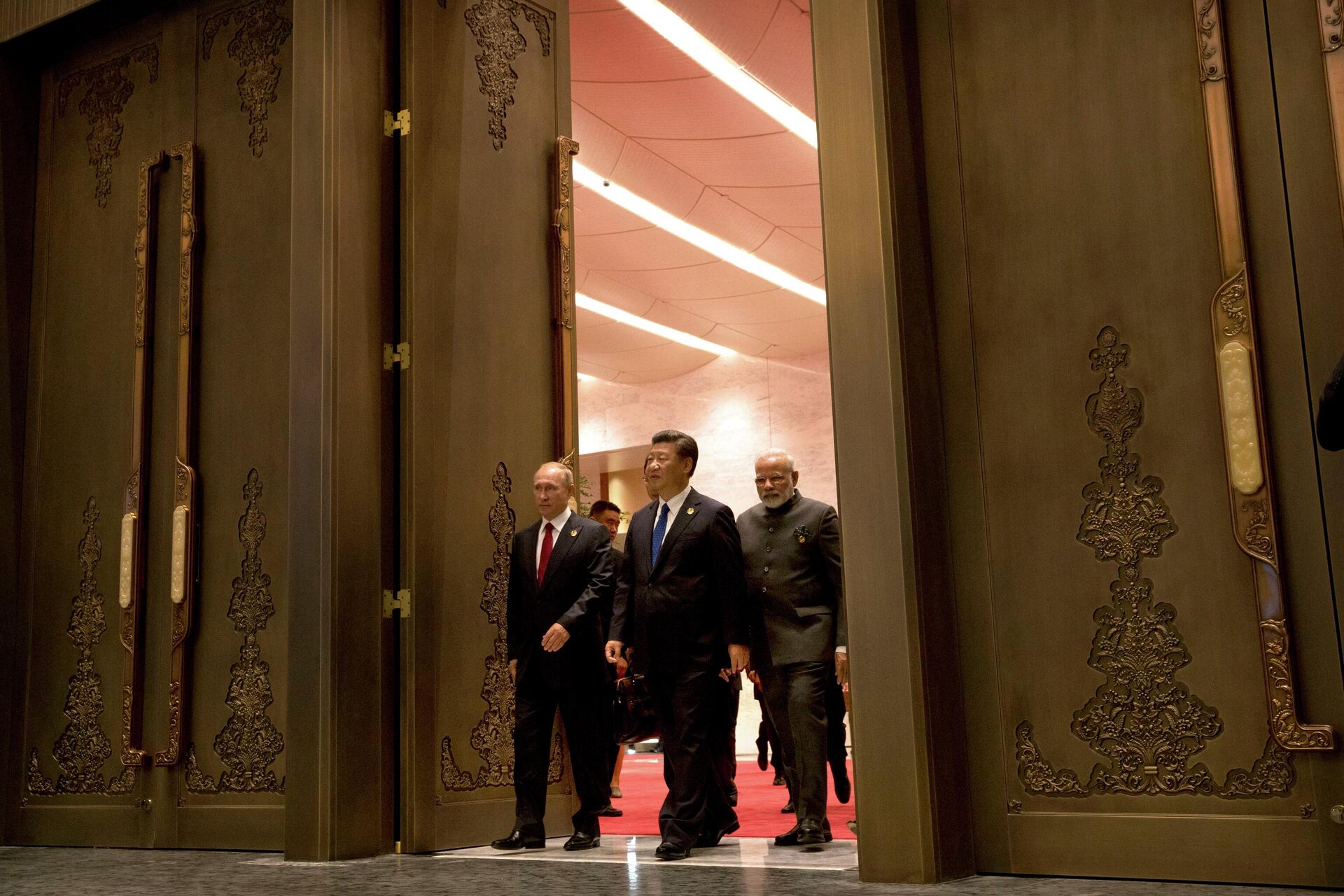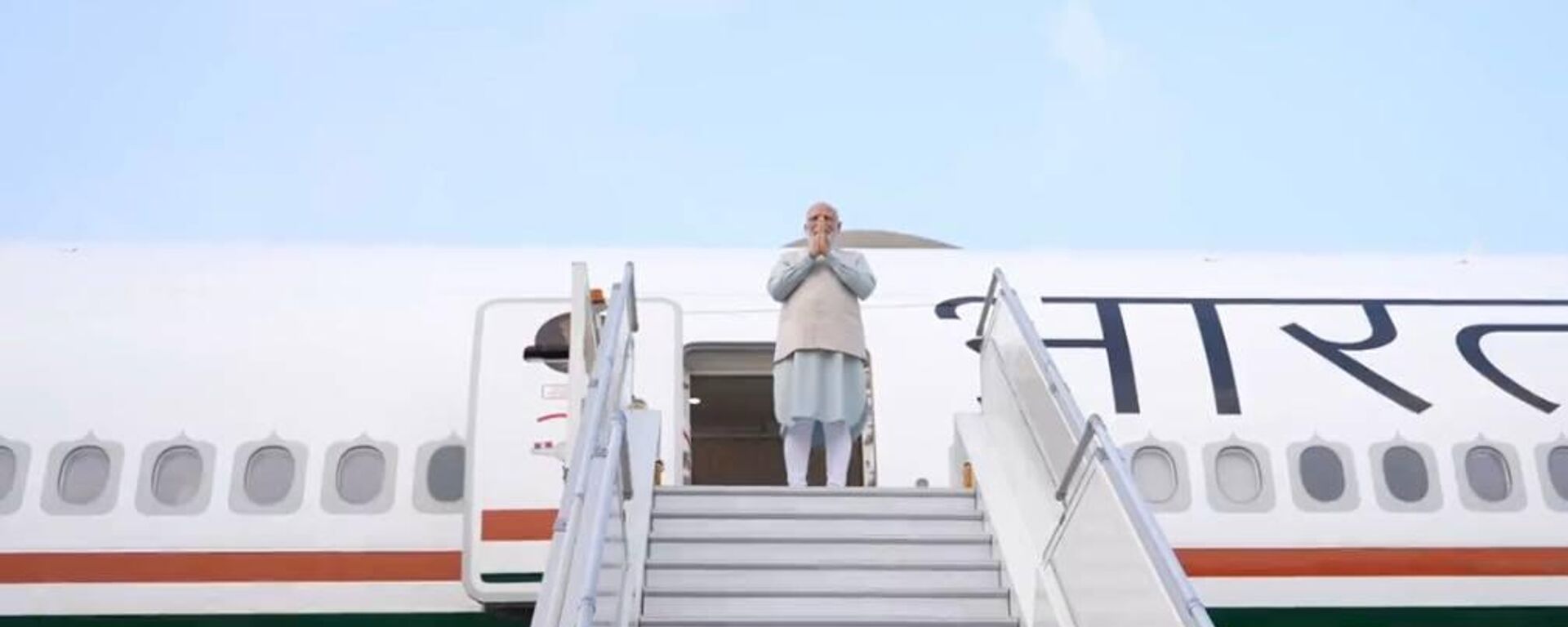https://sputniknews.in/20230824/brics-expansion-was-inevitable-as-un-has-become-defunct-expert-3808182.html
BRICS Expansion Was Inevitable as UN Has Become Defunct: Expert
BRICS Expansion Was Inevitable as UN Has Become Defunct: Expert
Sputnik India
The newly announced expansion of BRICS was inevitable given that the United Nations has failed as a global organization and now become defunct, a geopolitics pundit told Sputnik India on Thursday.
2023-08-24T16:29+0530
2023-08-24T16:29+0530
2023-08-24T16:29+0530
sputnik opinion
brics
2023 brics summit
beijing
china
delhi
new delhi
india
south africa
russia
https://cdn1.img.sputniknews.in/img/07e7/08/17/3783769_9:0:1278:714_1920x0_80_0_0_40daffaa0599165fa6e136ca46117cf1.jpg
The newly announced expansion of BRICS was inevitable given that the United Nations (UN) has failed as a global organization and now become defunct, a geopolitics pundit told Sputnik India on Thursday.BRICS Members Rise to Eleven from Five The remarks of Major General (Retd.) Shashi Bhushan Asthana came hours after BRICS nations agreed on a template to enlarge the grouping and subsequently stated that the influential forum will expand to 11 members following the inclusion of the UAE, Iran, Saudi Arabia, Egypt, Ethiopia, and Argentina.At present, BRICS comprises Brazil, Russia, India, China, and South Africa.With New Delhi and Beijing avoiding confrontation at the BRICS summit, it appeared as if the two sovereign states were trying to find common ground on the issue of the expansion of BRICS.No Clash Over Consensus Among BRICS Members Asthana, an Indian military veteran stated that India's point of view as far as the grouping's expansion was that there should be consensus.He pointed out that there were no disagreements between the BRICS members regarding the membership of the nations that are set to join the forum in the next few months. According to Asthana, there would not have been a clash of consensus on the names of UAE, Iran, Saudi Arabia, Egypt, Ethiopia, and Argentina and that is why the existing members of the BRICS would have agreed on their formal induction. He explained that why India insisted on having consensus is that if you, let's say, admit two countries who are adversaries of each other, it would make the organization defunct as you can't issue a joint statement.On the other hand, the strategic affairs specialist pointed out that most of the nations that will be joining BRICS are friendly to New Delhi as well as other BRICS countries. Moreover, these names were generally non-controversial.But he noted that when it comes to admitting certain countries where there are differences between the original BRICS members, there could be reservations.Nations Got Disappointed With the UN"Otherwise, conceptually, the expansion of BRICS was inevitable because people are disappointed by organizations like the United Nations (UN) which have become virtually defunct," Asthana added. Additionally, the former Indian Army officer opined that the one impact of the Russia-Ukraine conflict was that NATO was claiming that Western countries were getting closer and stronger.He argued that in international relations, there are no permanent adversaries and no permanent friends but there are permanent interests. Besides, there are some convergences and some divergences between rival countries.Convergences Between India and China In this context, he mentioned that the same thing applied to India and China. Because there were certain convergences between Delhi and Beijing as both were developing and non-Western nations.He observed that the other main factor behind their cooperation should be their emergence as global manufacturing hubs. While China already is the country with the world's largest manufacturing output, India is emerging to be one.If that be so, Asthana insisted, then these two countries should cooperate for the betterment of humanity in multilateral groupings like the BRICS, SCO, and other forums, including the G20 or the UN.India and China Both Countering Western Hegemony Similarly, in the area of trade, Beijing and Delhi should overcome their differences because the developed economies (read the West) follow a different mindset, whereas the developing world has a different orientation.
https://sputniknews.in/20230823/modi-invited-brics-nations-to-take-advantage-of-indias-rise-ex-envoy-3776583.html
beijing
china
delhi
new delhi
india
south africa
russia
moscow
ukraine
uae
saudi arabia
iran
argentina
egypt
ladakh
sino-indian border
Sputnik India
feedback.hindi@sputniknews.com
+74956456601
MIA „Rossiya Segodnya“
2023
Pawan Atri
https://cdn1.img.sputniknews.in/img/07e6/0c/13/139630_147:0:831:684_100x100_80_0_0_8fa2b25903e7787fe6a2698552c167df.png
Pawan Atri
https://cdn1.img.sputniknews.in/img/07e6/0c/13/139630_147:0:831:684_100x100_80_0_0_8fa2b25903e7787fe6a2698552c167df.png
News
en_IN
Sputnik India
feedback.hindi@sputniknews.com
+74956456601
MIA „Rossiya Segodnya“
Sputnik India
feedback.hindi@sputniknews.com
+74956456601
MIA „Rossiya Segodnya“
Pawan Atri
https://cdn1.img.sputniknews.in/img/07e6/0c/13/139630_147:0:831:684_100x100_80_0_0_8fa2b25903e7787fe6a2698552c167df.png
brics summit 2023, 2023 brics summit held in which country, 15th brics summit 2023, 2023 brics summit, brics summit 2023 theme, brics summit 2023 will be held in, brics 2023 summitbrics summit 2023 venue, brics countries want to join, brics expansion, brics membership criteria, criteria for brics membership, india china brics differences, expansion of brics, brics summit agenda, agenda of brics summit, putin brics, putin speech, putin news, modi speech, brics modi, brics expansion, brics currency, trade in national currencies, dedollarization, dedollarization news, ukraine russia news, brics membership, brics membership consensus, new brics members announced, uae joins brics, iran joins brics, saudi arabia joins brics, ethiopia joins brics, argentina joins brics, egypt joins brics, egypt brics, iran brics, argentina brics, uae brics, saudi arabia brics,
brics summit 2023, 2023 brics summit held in which country, 15th brics summit 2023, 2023 brics summit, brics summit 2023 theme, brics summit 2023 will be held in, brics 2023 summitbrics summit 2023 venue, brics countries want to join, brics expansion, brics membership criteria, criteria for brics membership, india china brics differences, expansion of brics, brics summit agenda, agenda of brics summit, putin brics, putin speech, putin news, modi speech, brics modi, brics expansion, brics currency, trade in national currencies, dedollarization, dedollarization news, ukraine russia news, brics membership, brics membership consensus, new brics members announced, uae joins brics, iran joins brics, saudi arabia joins brics, ethiopia joins brics, argentina joins brics, egypt joins brics, egypt brics, iran brics, argentina brics, uae brics, saudi arabia brics,
BRICS Expansion Was Inevitable as UN Has Become Defunct: Expert
South African President Cyril Ramaphosa on Thursday announced that Argentina, Iran, Ethiopia, Saudi Arabia, Egypt, and the UAE will become full members of BRICS from 1 January 2024.
The newly announced expansion of BRICS was inevitable given that the United Nations (UN) has failed as a global organization and now become defunct, a geopolitics pundit told Sputnik India on Thursday.
BRICS Members Rise to Eleven from Five
The remarks of
Major General (Retd.) Shashi Bhushan Asthana came hours after BRICS nations agreed on a template to enlarge the grouping and subsequently stated that the influential forum will
expand to 11 members following the inclusion of the UAE, Iran, Saudi Arabia, Egypt, Ethiopia, and Argentina.
At present, BRICS comprises Brazil, Russia, India, China, and South Africa.
The development came amid reports that differences between India and China were among the major hindrances in the expansion of BRICS. However, both the Asian giants avoided sharp comments directed at each other during the summit in Johannesburg city of South Africa despite their military standoff in the eastern Ladakh sector which has now stretched into a fourth year.
With New Delhi and Beijing avoiding confrontation at the BRICS summit, it appeared as if the two sovereign states were trying to find common ground on the issue of the expansion of BRICS.
No Clash Over Consensus Among BRICS Members
Asthana, an Indian military veteran stated that India's point of view as far as the grouping's expansion was that
there should be consensus.
He pointed out that there were no disagreements between the BRICS members regarding the membership of the nations that are set to join the forum in the next few months.
According to Asthana, there would not have been a clash of consensus on the names of UAE, Iran, Saudi Arabia, Egypt, Ethiopia, and Argentina and that is why the existing members of the BRICS would have agreed on their formal induction.
He explained that why India insisted on having consensus is that if you, let's say, admit two countries who are adversaries of each other, it would make the organization defunct as you can't issue a joint statement.
"It is something that is happening in the United Nations Security Council (UNSC), with the West on the one side and Russia and China on the other. As a result, no worthwhile joint/consensual statement is coming out of the UNSC," Asthana told Sputnik on Thursday.
On the other hand, the strategic affairs specialist pointed out that most of the nations that will be joining BRICS are friendly to New Delhi as well as other BRICS countries. Moreover, these names were generally non-controversial.
But he noted that when it comes to admitting certain countries where there are differences between the original BRICS members, there could be reservations.
Nations Got Disappointed With the UN
"Otherwise, conceptually, the expansion of BRICS was inevitable because people are disappointed by organizations like the United Nations (UN) which have become virtually defunct," Asthana added.
Additionally, the former Indian Army officer opined that the one impact of the Russia-Ukraine conflict was that NATO was claiming that Western countries were getting closer and stronger.
Asthana asserted that the other side of this argument was that the interests of other nations joining organizations like the BRICS have also become stronger. That's the reason, one will find that there are so many applications for joining the BRICS and the Shanghai Cooperation Organization (SCO),
He argued that in international relations, there are no permanent adversaries and no permanent friends but there are permanent interests. Besides, there are some convergences and some divergences between rival countries.
Convergences Between India and China
In this context, he mentioned that the same thing applied to India and China. Because there were certain convergences between Delhi and Beijing as both were developing and non-Western nations.
"The cooperation between the two Asian behemoths, especially in forums like BRICS was important to take care of the Global South, to take care of countries who are not well represented, and to take care of nations which are not in the Western camp," Asthana underlined.
He observed that the other main factor behind their cooperation should be their emergence as global manufacturing hubs. While China already is the country with the world's largest manufacturing output, India is emerging to be one.
If that be so, Asthana insisted, then these two countries should cooperate for the betterment of humanity in multilateral groupings like the BRICS, SCO, and other forums, including the G20 or the UN.
India and China Both Countering Western Hegemony
Similarly, in the area of trade, Beijing and Delhi should overcome their differences because the developed economies (read the West) follow a different mindset, whereas the developing world has a different orientation.
"Against this backdrop, if the voice of the developing world and the Global South has to be taken up, some kind of cooperation in certain areas where the Western hegemony has to be countered could be witnessed between India and China," Asthana concluded.





